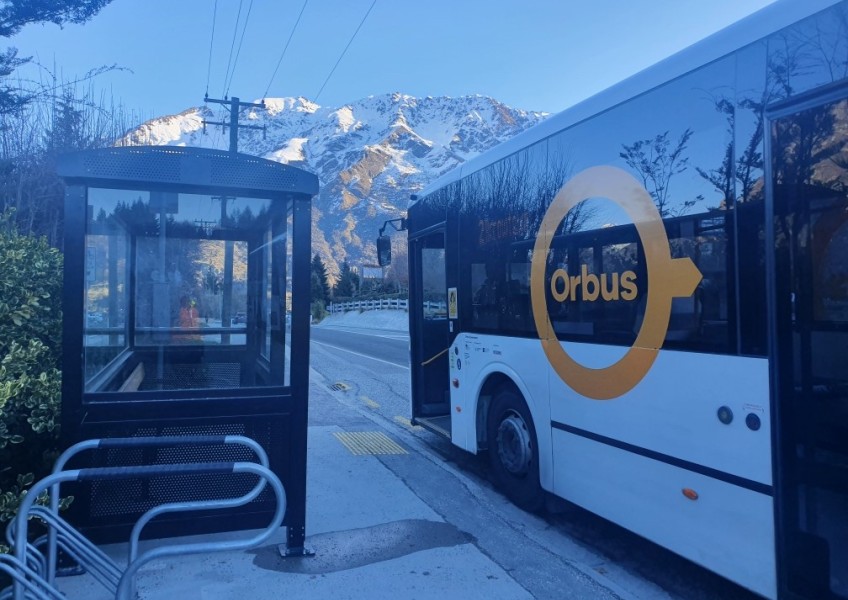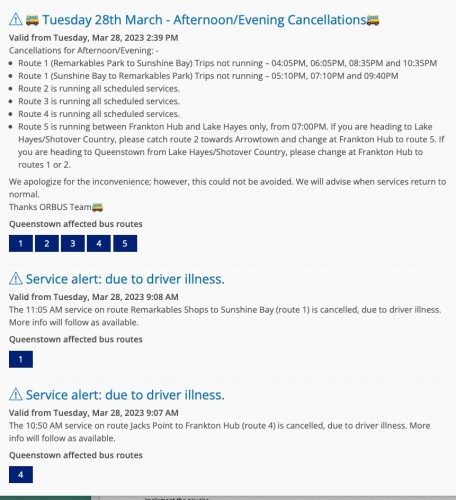
ORC bumps up bus driver pay to $30 an hour
The regional council is bumping up the wages of drivers on its public buses for the third time in seven months in the hope it will lure more to the job.
In a public excluded section of last week’s full council meeting, the Otago Regional Council approved a rise in wages for drivers on its Queenstown and Dunedin services from $27.76 to $30 per hour.
The move makes it one of the first councils in the country to reach the $30 mark.

Bus cancellations in Queenstown today - and this is just the start of the list.
The ORC has now delivered a more than 30 percent increase in drivers’ wages since August, when drivers were on $22.75 an hour.
The overall cost of the latest pay jump is $1.16 million, of which Waka Kotahi will pay 51 percent or $595,133.
The ORC’s interim chief executive Dr Pim Borren says pay rates are just one tool in the box to attract and retain bus drivers to Otago.
And it’s desperately seeking drivers.
The council’s been forced to cut bus services during the last year across both urban centres because of staff shortages.
Despite an announced return to full scheduled timetables in Dunedin earlier this year, users are still being left stranded at bus stops waiting for buses that are not turning up.
While in Queenstown, bus services continue to operate in a curtailed capacity, with multiple last-minute cancellations daily on top of that.
It's ironic, as more locals are jumping on the buses that are available than ever before.
In a statement in February, the ORC said trips in Dunedin were up 14 percent in six months, while in Queenstown the increase to the number of trips in the same period was “significantly higher” at 45 percent, despite the reduced schedules.
“The crucial issue remains that our bus operators just cannot get drivers on-board quickly enough,” Dr Borren says.
The pay hike will put public bus drivers in Otago on a wage that’s above the median rate of truck drivers.
It will also top the minimum pay required for migrant drivers (that’s $29.66) by Immigration New Zealand.
“For Otago, we really want to see a boost to driver numbers coming from the immigration system,” he says.
The ORC is now negotiating with contractors Ritchies, in Queenstown, and GoBus, in Dunedin, to implement the pay rise.
“This (pay rise) is a key decision especially for Queenstown which remains on a reduced timetable because of the time it is taking to recruit migrant bus drivers,” Dr Borren says.
In a report to council in February, ORC Chair Gretchen Robertson expressed her confidence that Ritchies was doing "everything within its power to try to recruit drivers" in the Whakatipu.
"But the critical shortage of labour in Queenstown across many industries has simply made it impossible to recruit drivers domestically. The operator has been proactive in sourcing drivers from offshore but the wait for visa approvals has been frustrating.
"I apologise to our Queenstown ratepayers for this failure to get the service back as I had made a personal commitment to achieving."
In response to questions from Crux earlier this month, Michael Carley, New Zealand Immigration's acting general manager for border and visa operations, said there's been moves to make it easier for New Zealand employers to recruit bus and truck drivers from overseas.
And, his team's been working to approve a huge increase in visa applications of this nature.
From the start of the year until March 6, 452 visas were approved for bus drivers and charter bus drivers. By comparison, in 2022 84 visas were issued for the same roles.






























